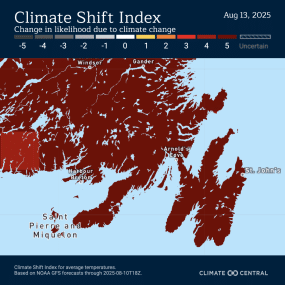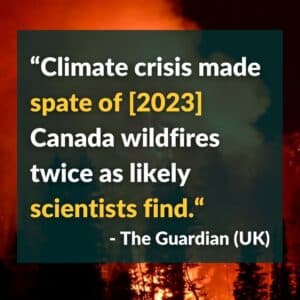Canada Wildfire Causes and Other Climate Impacts – Essential Reading
Anyone who has ever lit a campfire will know that the conditions into which a spark enters matter. If it’s dry and hot then fires start more easily, and they burn faster and hotter. With the Canada wildfire season already upon us it’s urgent that we understand the causes of these fires (and the indisputable link to oil and gas emissions) and other impacts.
Heat is an important driver of wildfires and Climate Central data shows much of Newfoundland (and many parts of Labrador) have experienced high temperatures made at least 5x more likely due to climate change (see image below from August 13, 2025). Climate-driven heat intensifies wildfires by drying out the landscape and contributing to hot, dry, windy conditions that supercharge wildfires. These conditions make it easier for fires to start and spread and harder to put out. (You can download graphics and check temperatures anytime using the Climate Shift Index tool here.)

Aug 13, 2025 – high temps made at least 5x more likely by climate change
The Climate Shift Index uses peer-reviewed methodology to determine the role of climate change on temperatures and compare it to a world without climate change and burning fossil fuels.
“Climate crisis made spate of [2023] Canada wildfires twice as likely scientists find. Burning of fossil fuels made fires at least twice as likely, and the fire-prone weather at least 20% more intense, study shows.”
Climate change made high temperatures at least twice as likely before the 2024 Jasper Wildfire and on the day the fire started, July 22, temperatures were 7.1° to 10.3°C higher across Jasper than averages recorded between 1991 and 2020..
Pine beetles & forestry practices were NOT the major factor in the Jasper fire – extreme heat and extreme conditions were the major factor (and indeed pine beetle numbers themselves are driven by warmer conditions and climate change). The general nation-wide increase in forest fires is NOT because of arson nor ‘chemtrails‘. CO2 is a pollutant in the case of climate change and human caused CO2 causes climate change – it’s not just plant food.
 In the wake of these ‘climate fires’ strong climate policies like the emissions cap, have become more urgent than ever. It’s also clear that oil and gas CEOs have been lying to the public and to their own workers for decades. A real, green, future for workers and communities is possible and necessary.
In the wake of these ‘climate fires’ strong climate policies like the emissions cap, have become more urgent than ever. It’s also clear that oil and gas CEOs have been lying to the public and to their own workers for decades. A real, green, future for workers and communities is possible and necessary.
Thirteen Canadian oil and gas companies, including five of the six that make up the Pathways Alliance oil sands lobby group, are on the list of 88 big carbon polluters called out for a major share of the forested lands lost to wildfires in North America between 1986 and 2021.
Canada has very high per capita emissions relative to other countries, and historical emissions, but our country’s failure to meet emissions targets is not individuals’ fault, this failure is the fault of large oil and gas companies which fail to act. We can’t ask other people with much lower per capita emissions to act on climate change if we don’t act to regulate these companies in Canada.
Workers are NOT to blame, but the executives and lobbyists at the top of oil and gas companies are definitely to blame. Being dependent upon oil and gas does not mean you can’t call for systemic changes to end that dependence and hold the oil & gas industry responsible for decades of lies that made things much worse.
Here are more sources and important reading:
“Criticism intensifies after big oil admits ‘gaslighting’ public over green aims. Fury as ‘explosive’ files reveal largest oil companies contradicted public statements and wished bedbugs upon critical activists…. Previous releases of internal documents have shown that the oil industry knew of the devastating impact of climate change but chose instead to downplay and even deny these findings publicly in order to maintain their business model.”
“The oily backroom campaign to sink the federal emissions cap.”
“The oil giant Exxon privately “predicted global warming correctly and skilfully” only to then spend decades publicly rubbishing such science in order to protect its core business, new research has found.”
“It is not arson: untangling climate misinformation around Canada’s raging wildfires.”
“I don’t think pine-beetle kill really played a role in this [Jasper] fire. I think this was an extreme heat, extreme wind, that really drove this fire to be as destructive as it was.” – Patrick James, associate professor at the University of Toronto’s graduate school of forestry.
“Wildfires around Fort Nelson, B.C., and Fort Liard, N.W.T., had caused widespread outages in Yukon and parts of N.W.T. — including 911 emergency services… Fires burned through Northwestel redundancy options.”
– CBC News [2024]
“Rise in extreme wildfires linked directly to emissions from oil companies in new study.”
– CBC News
“Canada’s forests haven’t absorbed more carbon than they’ve released since 2001.”
“Desjardins Exit from Flood Zone Mortgages May Ripple Across Canada.”
“Climate Disasters Set 2024 On Course for ‘Record Year of Human Suffering.’”
“Climate change is already costing Canadian households billions of dollars—and these costs are just the tip of the iceberg.”
“Hurricane Fiona is among 10 most expensive climate disasters worldwide: report.”
– CBC News
“‘We’ve been given opportunities to write entire briefing notes for ministers and premiers and prime ministers,’ Liam Iliffe [an oil and gas executive] told attendees at a TC Energy ‘lunch and learn’ session.”
The fossil fuel industry wants people to believe that it’s climate policy that’s causing a rise in cost of living, when it’s the industry’s actions and obscene profits that are really harming Canadians (for every dollar of inflation in the last two years in Canada, 25 cents of that has gone to oil and gas and mining extraction profits).
We could have a green future, where communities have greater control over their energy, the question is why do oil and gas CEOs want to hold us back from having that green future.
Read our fact sheet on the emissions cap. You can also consult this guide to common climate myths.
Other Myths on Climate Change
- A renewable energy transition is completely possible and people won’t freeze because of it. We deal with this in a recent podcast episode.
- The proposed emissions cap on the oil and gas industry will not have a negative impact on the economy either.
- Yes, CO2 is a pollutant in the case of climate change and human caused CO2 causes climate change – it’s not just plant food.
- Here is our fact sheet on carbon pricing, a different policy.
- No, volcanoes are not to blame for more emissions that humans and we should not be “taxing” volcanoes instead. Humans emit 100 times more CO2 than volcanoes.
- When it comes to Canada’s wildfires last year it is NOT arson that’s to blame and the climate crisis made the spate of Canada wildfires twice as likely, read more in untangling climate misinformation around Canada’s raging wildfire.
- Finally, Canada’s forests haven’t absorbed more carbon than they’ve released since 2001. Further, blaming other countries for climate change overlooks both Canada’s high per capita emissions and historical emissions that contributed to the climate crisis. We won’t inspire others to do more on climate change if we continue to contribute a lot more emissions per person than they do.
- You can find more on other common climate myths at this website.
